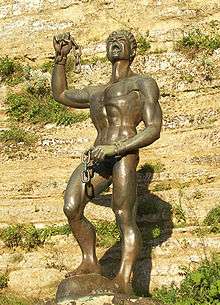Eunus

Eunus (died 132 BC) was a slave from Apamea in Syria who became leader of the slave uprising in the First Servile War (135 BC-132 BC) in the Roman province of Sicily. Eunus rose to prominence in the movement through his reputation as a prophet and wonder-worker. Said to blow fire from his mouth, Eunus claimed to receive visions and communications from the goddess Atargatis, a prominent goddess in his homeland; he identified her with the Sicilian Demeter. One of his prophecies was that the rebel slaves would successfully capture the city of Enna.
Eunus participated in the storming of Enna. Diodorus Siculus describes him standing in the front ranks of the assault, blowing fire from his mouth. Upon the capture of Enna, Eunus was crowned king. He subsequently took the name Antiochus, a name used by the Seleucids who ruled Syria. He called his followers, who numbered in the tens of thousands, Syrians and his armies took several other cities in central and eastern Sicily.
Eunus seems to have attempted to build a state independent of Romer, minting his own coins and evolving a command and supply structure capable of sustaining his forces in the field for long periods. He was successful in defeating Roman forces sent against him for several years. After the slave army was defeated by a Roman army under the leadership of Perperna, Eunus, with members of his "court", took refuge in a cavern, where he was subsequently captured.[1]
Most of the literary evidence for Eunus and the First Servile War comes from the writings of Diodorus Siculus, who used Posidonius as his primary source. Florus' Epitome, which provides excerpts from lost portions of Livy, is the most detailed account in Latin. Both Diodorus and Posidonius were sympathetic to the Romans. Diodorus lived in Rome, and Cicero asked Posidonius to write an account of the former's consulate. Since Eunus was a defeated enemy of Rome, their accounts of both the slave uprising and its leader were likely biased. Like Eunus, Posidonius was from the Syrian town of Apamea. He likely based his details about Eunus' worship of Atargatis in his personal knowledge of the goddess's mendicant priests.[2]
Archaeologists have found a small bronze coin, minted at Enna, which bears the inscription "King Antiochus". It is likely that the Antiochus in question is Eunus.[2]
References
- ↑ Mike Dash, "King, magician, general... slave: Eunus and the First Servile War against Rome." A Blast From the Past, 16 July 2016.
- 1 2 David Engels, "Ein syrisches Sizilien? Seleukidische Aspekte des Ersten Sizilischen Sklavenkriegs und der Herrschaft des Eunus-Antiochos", in: Polifemo 11, 2011, pp. 233–251